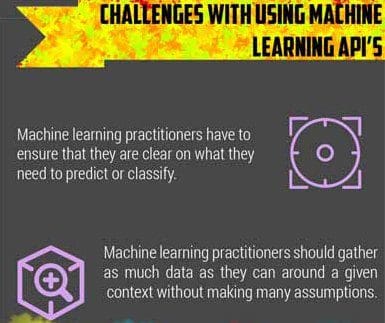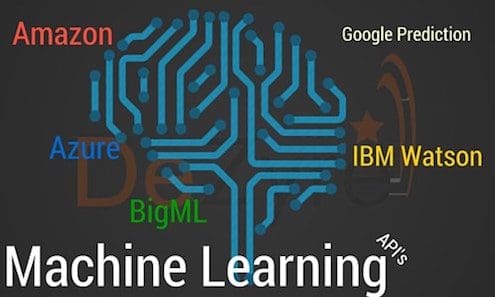5 Best Machine Learning APIs for Data Science
Machine Learning APIs make it easy for developers to develop predictive applications. Here we review 5 important Machine Learning APIs: IBM Watson, Microsoft Azure Machine Learning, Google Prediction API, Amazon Machine Learning API, and BigML.
By Khushbu Shah (DeZyre).
Big data is streaming into businesses all over the Internet from various data sources like sensors, social media data, excel spreadsheets, reviews, customer data, etc. There are many companies like Google, IBM, Amazon, and Microsoft helping businesses process big data by building Machine Learning APIs so that organizations can make the best use of the machine learning technology.
Machine Learning is the big frontier in big data innovation but it is daunting for people who are not tech geeks or data science domain experts.Similar to how standard APIs help developers create applications, Machine Learning APIs make machine learning easy to use, for everyone. Machine Learning APIs abstract the complexities involved in creating and deploying machine learning models so that developers can focus on data munging, user experience, design, experimenting and delivering insights from data.
In the early days, machine learning algorithms and technologies were mostly used by scientists, tech geeks or domain experts. However, several organizations are now using Machine Learning APIs to make these technologies available to the masses. Machine Learning APIs make it easy for developers to apply machine learning to a dataset so as to add predictive features to their applications. Machine Learning APIs provide an abstraction layer for developers to integrate machine learning in real world applications without having to worry about scaling the algorithms on their infrastructure and getting into the details of the machine learning algorithms. Machine Learning APIs require developers to focus on the two important aspects-
- Developers can concentrate on querying predictions by integrating Machine Learning APIs into their applications.
- Developers can track events on their applications to collect usage data.
Machine Learning APIs provide businesses with the ability to bring together predictive analytics so that they can get to know their customers better, understand their requirements and deliver products or services based on the past data trends, thereby initiating the selling process.There is an increasing percentage of real time consumer interactions through Machine Learning APIs – making them an ideal option for exposing real time predictive analytics to app developers.
Application developers always look for various ways to ease the lives of their users by introducing novel and innovative features that can help users save time. This is the reason for the popularity of Machine Learning APIs in app developers. Some standard examples of these APIs include Smart Tagging, Product Recommendations, Priority Filtering, and Spam Filtering.
Challenges Associated with using Machine Learning APIs
The most time consuming and important part of using machine learning APIs is identifying the business problem that needs to be solved and building meaningful datasets. This implies-
- Machine learning practitioners have to ensure that they are clear on what they need to predict or classify. Every problem cannot be solved with machine learning APIs so it is important to decide on whether the scenario fits or not.
- Machine learning practitioners should gather as much data as they can around a given context devoid of making several assumptions. This is important because data scientists or analysts will frequently find out unpredictable correlations between the input data and the column that they are trying to predict or classify i.e. the target value
Top Machine Learning APIs for Machine Learning Practitioners
The latest trend in Machine learning to be commoditized into a service which will develop into the mainstream as commoditized visualization and storage. Here are some of the best machine learning APIs that provide commoditized machine learning as a service (MLaaS) to business analysts and developers for application integration-
1) IBM Watson
For Machine Learning practitioners who are crunching at the moment to use IBM Watson’s machine intelligence service, within their mobile or web applications, need gnaw no longer. IBM Watson API is a cognitive service that simplifies the process of preparing data and makes it easier to run predictive analysis. It also provides the usage of visual storytelling tools such as infographics, maps or graphs to exemplify analysis results. IBM Watson is available for public use through IBM’s Bluemix cloud services platform.
IBM’s Watson is listening, watching, talking and understanding with the expanded set of tools, machine learning technologies and cognitive APIs to make itself more human. Developers can create products, services or applications with more cognitive skills by embedding with IBM Watson to understand how humans interact and react with their applications. IBM Watson has evolved in just 2 years with more than 25 APIs that are powered by approximately 50 technologies. Some of the best services provided by IBM Watson API for building cognitive apps –
- Machine Translation-Helps translate text in different language pairs.
- Message Resonance– To find out the popularity of a phrase or word with predetermined audience.
- Question and Answers-This service provides direct answers to the queries that are triggered by primary document sources.
- User Modelling– To make predictions about social characteristics of someone from given text.
2) Microsoft Azure Machine Learning API
Azure Machine Learning API helps data scientists publish in minutes which once used to take days after they had developed a feasible model. Azure Machine Learning makes it easy for data scientists to use predictive models in IoT applications by providing APIs for fraud detection, text analytics, recommendation systems and several other business scenarios. The API is built on the machine learning abilities that are available in Microsoft products like Bing and Xbox.
Azure Machine Learning API provides various features like –
- Ability to create a customized configurable R module so that data analysts or data scientists can incorporate their own R language code to train or predict tasks.
- Azure allows data scientists or analysts to include their own Python scripts using various Python libraries for data science like SciPy, SciKit-Learn, NumPy, Pandas, etc. Popular tools like iPython Notebook and various other Python tools for Visual Studio can also be used with the Azure Machine Learning API.
“We have added Python, which is a big favourite of data scientists. There is a huge ecosystem for this. This capability will be powerful for data scientists. We made a lot of improvements and adding Python was part of that. Azure Machine Learning is the platform. You can copy a bit of Python code and plug it into the studio and create an API.”- said Joseph Sirosh, Corporate Vice-President at Microsoft


